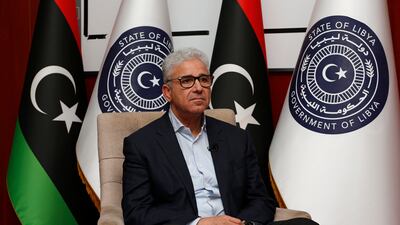Libya has little chance of holding elections this year, the parliament-backed prime minister said, raising the prospect of further uncertainty for the OPEC member’s oil industry at a time when the market is in urgent need of its crude.
Fathi Bashagha, who is engaged in a stand-off over the premiership with Abdul Hamid Dbeibah, predicted the political upheaval would continue throughout 2022, deepening a rift in the North African nation’s fragile institutions.
Without a unified government, “there will be no elections and chaos will continue,” Bashagha told Bloomberg.
The former interior minister, however, downplayed the possibility of a new outbreak of civil war in a country that is trying to emerge from a decade of conflict.
He pledged to hold free and fair presidential and legislative elections as soon as possible.
He also vowed to create the post of chief co-ordinator of elections to fully develop the technical requirements, timelines and necessary steps for elections.
Oil production
More turmoil would worsen a scarcity of Libyan crude after a wave of port and oilfield shutdowns started in April by protesters in a bid to force Mr Dbeibah out. Global crude prices have surged by about 50 per cent this year to $110 a barrel.
Libya's National Oil Corp output has plunged to a daily 100,000-200,000 barrels from as much as 1.3 million last year.
Mr Bashagha said he had no up to date oil production figure, but that his government’s spending blueprint included 34 billion dinars ($7 billion) requested by the corporation to enact a two-year plan to boost output to more than 1.7 million daily barrels.
Control of Libya’s oil wealth has been a major obstacle to stability since the 2011 Nato-backed overthrow of Muammar Qaddafi, with militias and protesters using stoppages to push political demands.
Mr Bashagha and Mr Dbeibah were among those who hoped to stand for president last December in a vote that was called off amid fears of fresh strife.
He said recent oil blockades were “a direct result of the injustice the people living in the oil crescent have been and are still suffering to this day”.
Mr Bashagha said “people in the east” of the divided country were “angry and unsatisfied with the state and as long as justice is not addressed and revenues are not distributed fairly, closures of oil will continue”.
He said that If he took office in Tripoli, he would rotate the government between there and Sirte in a bid to address peoples’ concerns over regional marginalisation.
Politicians who support Mr Bashagha say Mr Dbeibah’s mandate is invalid after the election that did not take place. They chose Mr Bashagha to replace him and in May he tried to enter the capital, Tripoli, only for violence to erupt between rival militias and force his withdrawal.
Mr Bashagha is now setting up in the Mediterranean coastal city of Sirte, evoking memories of the roughly seven-year period from 2014 when Libya was split between rival administrations. He said he was still seeking to govern as premier from Tripoli, but would not run in any future elections.
He said he had no intention of entering Tripoli by force, unless there was a threat of “terrorism”.
Cairo talks fail
The rival factions failed to reach an agreement in a third round of talks in Egypt, the UN said on Monday.
According to UN special adviser on Libya, Stephanie Williams, politicians from the parliament in the east of the country and the High Council of State, in Tripoli, ended talks in Cairo aimed at clearing the way for elections without a breakthrough.
The talks, which stared on June 12, had sought to establish a constitutional framework for elections in Libya, but the two sides failed to agree on “the measures governing the transitional period” leading to the vote, Ms Williams said.
She called on Aguila Saleh, the influential parliament speaker, and Khaled Al Meshri, head of the Tripoli-based council to convene within 10 days to try to bridge the gaps between the two sides.
Libyan media reports claimed that the main contested topic was the criteria for a presidential candidacy.
The Tripoli-based council insisted on banning military personnel from running for the country’s top post — apparently a move directed at commander Khalifa Hifter.

